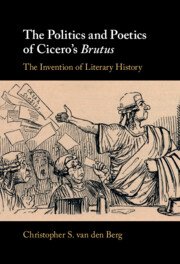All translations are mine unless otherwise noted. In rendering Cicero’s Brutus into readable English, I have benefited immensely from Robert A. Kaster’s translation and hope that the reader will have had a chance to consult it (if not the Latin) before reading this book. I have sought to be fairly literal in translating, while also seeking to avoid clumsy or outdated English. I follow the Teubner text (E. Malcovati, 2nd rev. ed., 1970) with changes as noted, several of which are adopted from Kaster (Reference Kaster2020). Latin passages quoted are accompanied by translations, except when occasionally the immediate discussion paraphrases the Latin. Citations of the Brutus are not preceded by its title, so section numbers appearing without further attribution refer to it. To avoid footnote fatigue, citations and quotations of the Brutus typically occur in the body of the text. All dates are bce unless otherwise noted.
Journal titles are abbreviated in the References according to the conventions of L’Année philologique. The abbreviations for Greek and Latin works are from the Oxford Latin Dictionary, when available, and otherwise from the Oxford Classical Dictionary. Other abbreviations are listed below.
Lastly, in a study of the intellectual framework and rhetorical crafting of the Brutus’ literary history, succumbing to the explanatory allure of Cicero’s vision is almost inevitable. One motivation for writing this book was precisely to expose the sway Cicero has held over modern conceptions of literatures and their histories. Nonetheless, to appreciate and explain Cicero’s choices and characterizations is not to accept his prejudices and flaws. Still, it seemed a graver error to repeatedly pepper the text with interjections such as “so Cicero claims” or “as Cicero would have us believe.” I hope the reader understands that economy of exposition is meant to convey the enticing power of Cicero’s narrative even when, as often happens, I tacitly disagree with his ideas or the unquestioned assumptions that sustain them.

